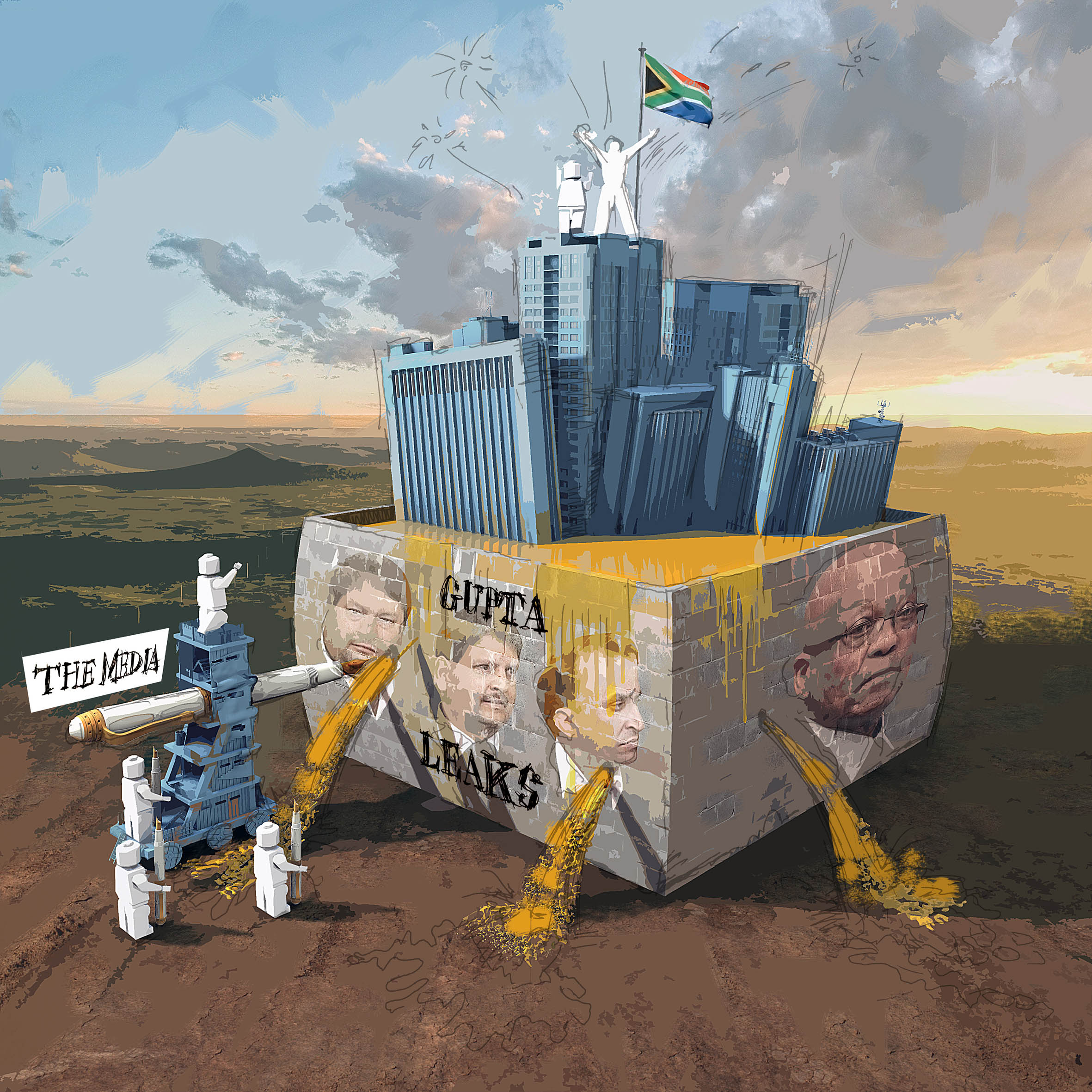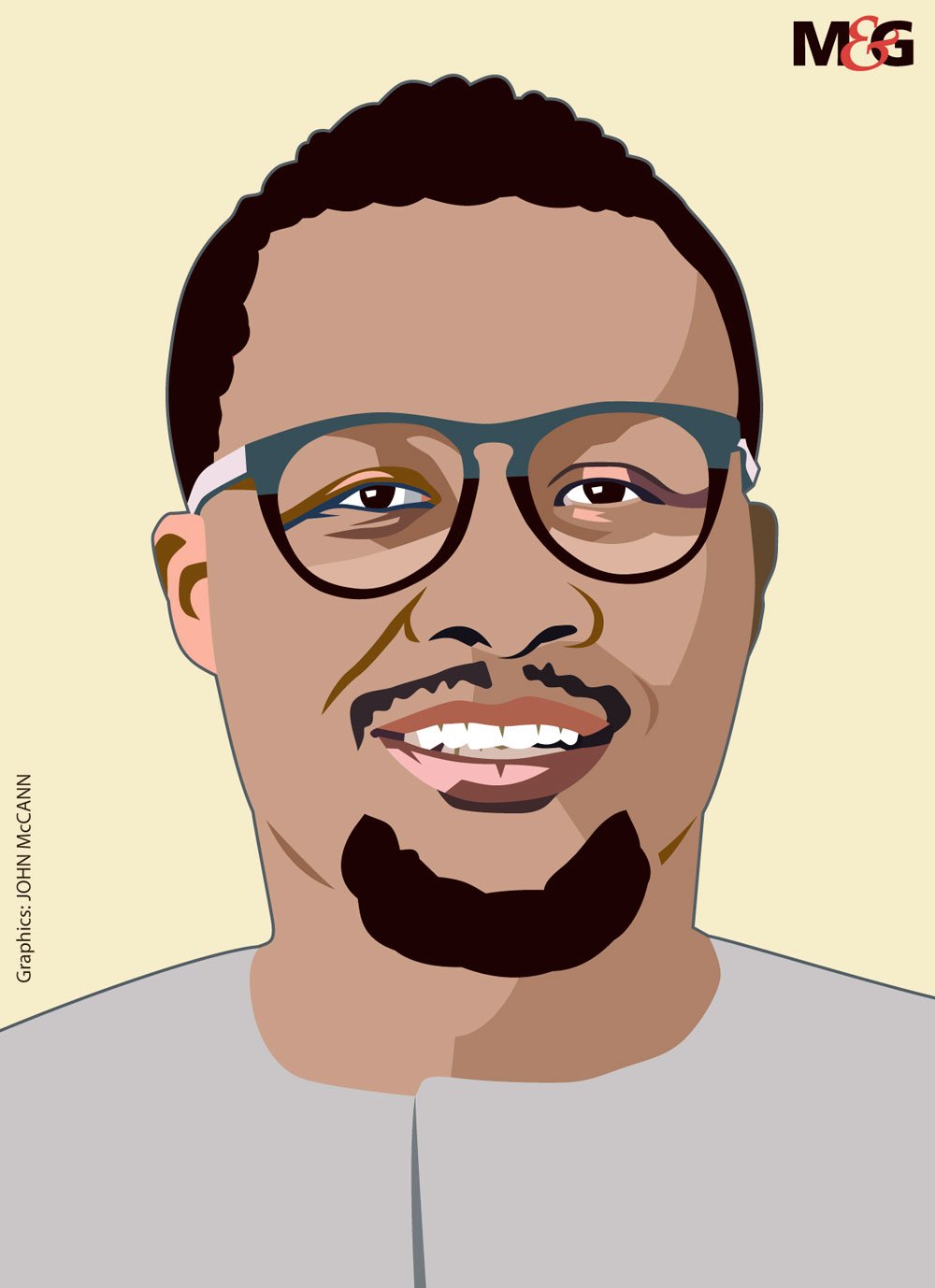Dismay, disbelief, anger: When the votes were counted at the 2017 national elective conference and Ramaphosa was announced the new president of the ANC, defeating Dlamini-Zuma, Jacob Zuma struggled to control his emotions. (Gulshan Khan/AFP)
ANALYSIS
Investigative journalists helped pull South Africa back from a precipice by exposing the depth of state capture. But they are now staring into an abyss of their own: populist hostility, a funding crisis and waning public trust. On balance, our press remains one of the freest in the world – but for how long? By Carlos Amato
PART I: THE CACHE
If the truth is dead these days, it has a well-preserved corpse. It still hurts, and it still sets us free. Ask one Jacob Gedleyihlekisa Zuma: a year ago, he felt the fist of truth to his jaw, in a moment immortalised on cellphone video by eNCA reporter Nickolaus Bauer at the ANC’s national elective congress.
The former president’s chest heaved, and his face warped and twitched in a futile struggle to mask his shock. The election results were being announced on the podium: Cyril Ramaphosa was the new ANC president. Zuma’s kleptocracy was doomed, along with his dreams of a safe and luxurious dotage.
The direct cause of the Zuptas’ fall was Mpumalanga premier David Mabuza’s defection from the Nkosazana Dlamini-Zuma slate, taking his loyal delegates with him. But that was an informed decision. It was based on the greatest truth bomb in post-apartheid South African history: the Gupta emails. That vast cache, leaked to the press in the winter of 2017, revealed in granular detail the mafia network that had captured the state. It corroborated a web of corrupt relationships, many of which the press had already traced, but had not yet been able to prove; it turned a spider diagram into a spider.
Despite his Machiavellian makeup — or perhaps because of it — Mabuza could see the game was up. It was time to launder himself as a constitutionalist and let the rest of the crooks go down. The licence to steal would not be renewed.
Said Sam Sole of amaBhungane, the investigative team at the centre of the Gupta leaks revelations: “We did once-in-a-lifetime work, and I think it had a profound influence on the body politic and the society, even though the main reason we have Ramaphosa and not Nkosazana Dlamini-Zuma was that Mabuza switched sides. But the indications are that he made quite a rational assessment of the future rather than the present, and that, electorally, the Nkosazana option was really going to be a bad one in 2019. And I think we contributed in a significant way to that being a realistic assessment.”
AmaBhungane first wrote about the Gupta family and Jacob Zuma in 2010.
The effect of the Gupta leaks, and the scale of the journalistic feat of making them count, has been lost in the cacophony of current politics. Amid the shadows that have fallen on South Africa’s media — vengeful threats and slander, mad and greedy owners, troll farms, false reporting, shrinking newsrooms — it’s easy to forget that journalists gave this country another shot at justice.
Very few people know the identities of the two butterflies who caused the hurricane in December last year at the ANC’s Nasrec elective conference by copying the Gupta emails from a mystery computer drive.
The first nameable person in the chain of intermediaries who brought the emails to light is Branko Brkic, editor of the Daily Maverick.
The audacious Serb, who arrived in South Africa in the mid-1990s, had already made waves in his adopted country by creating a trailblazing free news and analysis website. The Daily Maverick has enriched the national political conversation, attracting voices and readers from across the ideological spectrum. (It also habituated readers to getting quality news for free, thus helping to doom the online paywall as a revenue stream for print newspapers.)
When Brkic received a USB drive containing a “highlights package” of the Gupta emails from a mystery intermediary, he was overwhelmed. As he told Anton Harber, in Southern African Muckrakers: 300 years of Investigative Journalism That Has Shaped The Region: “I immediately thought, this is bigger than the Daily Maverick; this had to be industry-wide.”
So Brkic made contact with Stefaans Brümmer at amaBhungane. They met for midday coffee. Brümmer ordered a vodka instead when he discovered the reason for the meeting.

Stefaans Brümmer: “We knew something that would go to the heart of the Gupta empire.”
“We knew we had something that would go to the heart of the Gupta empire,” Brümmer told Harber. “This would end plausible deniability. But we did not know what the reaction would be. We knew that, once we started with this story, we were in uncharted territory. We had to be extremely careful, for ourselves and for everyone involved.”
Once the Daily Maverick and amaBhungane had struck a co-operation deal, Brkic delivered the USB stick at midnight to Brümmer in the dorp where he was spending the weekend. As Brümmer trawled through the emails, their authenticity became inescapable.
It seemed appropriate to go full cloak-and-dagger at this point. All communication had to be face to face, with the exception of coded emojis. A smiley face from Brümmer told Brkic the cache looked genuine. Later, whenever it was necessary to talk, they would send a panda bear emoji — a signal to meet and stroll through a park.
Brümmer flew to Durban to brief Sole in person, and it was agreed that more resources were needed to maximise the effect of the emails. Later, after the first round of publication, Adriaan Basson and his News24 investigative team were enlisted to help publish the revelations.
Pauli van Wyk, now at Scorpio, the Daily Maverick’s investigative unit, was a reporter at the Mail & Guardian at the time. Brkic had previously tried to headhunt her, and this seemed the moment to try again. He invited Van Wyk to his “second office”, the Woolworths restaurant in Hyde Park Centre in Johannesburg.
Van Wyk said: “He said to me, ‘Let’s put our phones away because I have this big project, but I can’t tell you about it unless you’re on board.’ So I said yes.” Then Brkic described the emails. “The first thought I had was, oh my fucking word, I’ve said yes to a madman.”
It turned out Brkic wasn’t mad, which was just as well, because some very sane decisions were needed. The stakes were huge, both for the country and the two whistle-blowers.
 (Illustration: Francois Smit)
(Illustration: Francois Smit)
Sole said: “In meetings with lawyer Brian Currin it was agreed that we need to raise enough money to relocate the two families abroad.”
Currin is the human rights lawyer who protected the original hard drive containing the emails.
“But Branko didn’t have a budget for that,” said Sole. “So then Stefaans and Branko had meetings with various rich people, and other entities with money, to try to raise the cash.
“Somewhere in that process, material was shared, and someone in that chain decided we were taking too long and the ANC was having its NEC [national executive committee] meeting — and that this was going to be the silver bullet that would get rid of Zuma straight away.”
The NEC meeting would take place on Sunday, June 3 2017 and the word from ANC sources was that an unprecedented motion of no confidence in Zuma would be discussed and possibly held. One (or more than one) of the intermediaries was also getting impatient with the Daily Maverick/amaBhungane/News24 team’s cautious approach. They hoped that, if the highlights of the leaked emails were in the newspapers that Sunday morning, a narrow majority of constitutionalists in the NEC would be sufficiently stunned by their revelations to summarily depose the president. So the highlights package was passed to the Sunday Times and City Press.
“We were completely unaware of that going on,” Sole said. “As far as we were concerned, our plan had been to raise the money for the whistle-blowers, get them out of the country. Branko was going to hire a farmhouse in Ireland, because there were no visa issues for South Africans visiting Ireland.
“We were going to work secretly for two or three months to really work this up,” said Sole. “We would only start publishing once the whistle-blowers were out of the country, because we didn’t know what kind of reaction there would be — whether the state and the Guptas would react really strongly. Berning Ntlemeza was still heading the Hawks. They were a creature of that faction, and weren’t particularly worried about legalities.
“On the Saturday night when the Sunday Times started tweeting about the story, Branko was in Europe, and he had put down a deposit on a place that we were going to rent. Fortunately, for some reason or other, the credit card had bounced, so the payment hadn’t gone through.
“So we saw the Sunday Times tweets — and kapow! — it was their splash the next morning. We’d been scooped on our own scoop,” said Sole.
(Zuma survived the bid to remove him from office. As Gareth van Zyl wrote in BizNews: “Of the just over 70 NEC members, only 18 stood up to challenge Zuma, illustrating the stranglehold he has over his party and South Africa … Like an abusive relationship, just when you think something may happen to break the cycle of hurt, it just continues.”)
Thanduxolo Jika, now investigations editor at the M&G, was working at the Sunday Times. “I wrote the first story,” he said. “We went with [editor] Bongani Siqoko to meet someone, one of our trusted sources, and overnight Bongani and I went through it.
 Thanduxolo Jika: “We should not be entrenching ourselves and choosing sides. There are no angels.”
Thanduxolo Jika: “We should not be entrenching ourselves and choosing sides. There are no angels.”
“Because we had been writing about state capture for such a long time, there were only a few things we needed to match up. We had already firmed up a lot of the information. Then, of course, the AmaB guys were not happy … ”
In an angry editorial in the Daily Maverick, Sole, Brkic and Brümmer attacked the source who had handed over the highlights package and also threw some shade at the Sunday Times and the City Press teams. “One does not publish before taking all reasonable steps to secure sources who may be in harm’s way,” they wrote.
Siqoko and Jika did not enjoy this remark, because the person who gave them the highlights package had not told them of the potential danger to the two whistle-blowers.
Also, the Sunday Times had offered a right of reply to the people implicated in their story. AmaBhungane and company had chosen not to do this — a decision the Press Code does sanction in extenuating circumstances, such as a clear risk of illegal pre-emptive retribution.
In a fiercely competitive media landscape, this kind of spat is common, and the two teams made up a couple of weeks later. “Stefaans met Bongani in Jo’burg and told him their side of the story,” said Jika. “We smoked a peace pipe.”
He said there is always a risk of getting scooped if a journalist sits on a major story. “Sources have agendas — they don’t give you things for the fun of it. So, if you’re not acting on it, they will give it to somebody else. You might plan something for months and get scooped. AmaBhungane were a victim of that. I had no idea they were planning anything. I got a story that confirmed what I had been working on for two years, and I had no obligation to phone around and ask people: ‘Guys, are you working on this?’ I published. It’s the nature of what we do,” said Jika.
Sole said his team was much more annoyed at their intermediaries for jumping the gun than with the Sunday Times for running the story. “We weren’t blaming them, because they didn’t have the background.
“[But] the whistle-blowers were still here [in South Africa], and every accessible copy of the data was still here. We now know from Currin that he had already taken one copy overseas, but it was encrypted and he didn’t have the key. The sources had the key, so the offshore copy wouldn’t be of much use to anybody. If, on the day that it was published, they had rounded us all up, and the whistle-blowers, they could have shut the whole thing down.”
In the end, nobody was arrested. “Partly because we had kept very good security, the state was caught on the back foot,” said Sole. “If our security had been worse, and they had had time to assess and prepare and knew what we had, then I think there might not have been an unrealistic fear for all our safety.”
Once published, the story was simply too big to kill, and the press was too powerful to attack. But that would change.